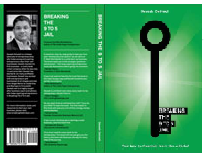Lawyer For Entrepreneurs – Stephen Furnari
Posted Under: Entrepreneurship, Our Heroes
Today’s guest under the “Our Heroes” series is Stephen Furnari, an accomplished corporate transactional lawyer turned self-employed lawyer. Following the dot-com bubble burst and the resulting downsizing in the corporate legal market, Stephen was laid off twice within six months. This pushed Stephen to materialize his dream of opening his own firm where he had full control over his financial security and professional development. Let’s hear more about how Stephen transitioned into entrepreneurship…
 DD: Who are you and what kind of corporate job were you at?
DD: Who are you and what kind of corporate job were you at?
SF: My name is Stephen Furnari. I am a business lawyer and I help business owners achieve their entrepreneurial dreams by minimizing legal risks that derail business plans.
Before becoming a self-employed lawyer, I was a corporate transactional lawyer with a large, New York law firm. I represented mid-sized companies in IPOs, Corporate Finance transactions and Merger & Acquisition transactions.
DD: What made you leave the job?
SF: After the dot-com bubble burst (and the 9-11 tragedy), there was massive downsizing in the corporate legal market. By July 2002, I had been laid off from jobs at two firms in six months.
DD: When did you realize that you want to be an entrepreneur & why?
SF: My professional plan was always to run my own law firm. I had been starting businesses in one form or another since I was 12 years old (mowing lawns, shoveling snow, etc.).
However, the big push into entrepreneurship happened after getting laid off from the first law job. I noticed that only the attorneys who were entrepreneurial (had a book of portable business) kept their jobs. Even then, some lawyers with their own clients got cut for very subjective reasons that were outside of their control.
I saw partners who worked very hard, sacrificing family and personal time to work late nights and weekends for the firm, get cut without much explanation. These lawyers had families, mortgages, tuition payments and lifestyles built around very generous salaries. Working hard wasn’t enough, you have to be able to make rain to survive, and even then, you could still lose your job for political reasons.
At that point, I realized that I no longer wanted to put my financial security and professional development in the hands of a law firm’s management committee. I only wanted to work for myself.
DD: What did you do to break the corporate jail? How did you prepare yourself for the employee to entrepreneur transition?
SF: Before I started working at “big firm” jobs, I worked for a small law firm. I had a few, smaller clients who were not appropriate for the big firm. I started a professional corporation through which I represented these clients at night and on weekends. I had bank accounts, letterhead, phone numbers already.
Getting laid off from the second law job was the push I needed to pursue entrepreneurialism full time. I used whatever savings I had at the time, my 401K and five credit cards to start.
The initial months were tough. Most of my business had previously come by leveraging other law partner’s clients. I had never really had the chance land clients from my own marketing. I had to learn how to market myself and do sales. I hired a sales coach, took seminars on marketing and read a lot of books.
DD: What are your Top 5 tips for employees who want to be entrepreneurs but are hung up on something?
SF: 1. Get Your Personal Finances Under Control. The more you can scale back your personal expenses, the longer you can give your business to get to profitability. For most entrepreneurs, the first year (or longer) will be lean. The better you can get your personal spending in check, the greater chance you have for success. In the long run, it’s liberating to get rid of all the excessive spending.
2. Write a Plan. Have an idea of what you want to do. I did this when I started my business with the help of my local Small Business Development Center. The resource is provided for free from the SBA, you can go to SCORE (also free), or pay someone to help you, like Axxess Business Consulting, Inc. It doesn’t have to be super formal, but project your revenues and expenses and have a marketing plan for the next six months (at least).
3. Find Good Professionals. Entrepreneurs are bootstrappers, but you can’t cut corners on relationships with good professionals. In the excitement of running their companies, business owners frequently make critical legal and accounting mistakes that can derail their companies or cost them thousands of dollars to fix.
Often, these problems could have easily been avoided with minimal investment when they organized their businesses, or before mistakes became major problems. My job as a corporate attorney is to make sure my clients do everything they can to minimize the risks that are within their control and to avoid conflicts that can land them in litigation, or worse. In the long run, clients save money on legal and accounting fees.
4. Market, Market, Market. If you don’t know how to self promote, take a class, hire a coach or read a book. There’s no more important part of your business. Almost every problem in a start up business can be resolved by more revenue coming through the door.
5. Take the Leap and Don’t Look Back. Starting a business is a lot like deciding to start a family. You do the best you can to get ready, but ultimately you have to just take the leap. If you wait until you’re “ready”, you’ll never do it. Making that decision is the one thing that all entrepreneurs have in common, and I find that entrepreneurs have a lot of mutual respect for each other for taking that risk.
DD: How are you now? Are you still in same business, and how do you feel?
SF: AWESOME!!! I wouldn’t change my decision to start my own firm for anything. Eight years after starting my own business, I still run my law practice, plus a second business called Law Firm Suites where I rent a total office solution to other solo attorneys and small law firms.
When the market tanked last year, many of my friends and colleagues who stuck it out as employees with law firms (after the last recession) lost jobs. Many of these lawyers are still unemployed. Thankfully, my two businesses have continued to thrive.
DD: That was Stephen Furnari who told us about his legal road to success. It’s great that he is doing so well and after eight years on his own is positive and pleased with his decision to start his own firm. I especially liked Stephen’s remark about taking the first jump into entrepreneurship: “Making that decision is the one thing that all entrepreneurs have in common, and I find that entrepreneurs have a lot of mutual respect for each other for taking that risk”.





